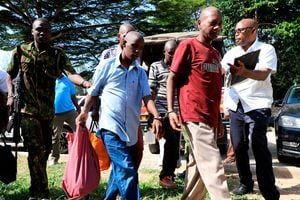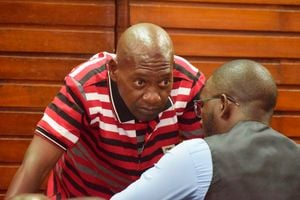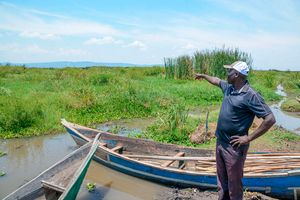
Suspected Kilifi cult leader Paul Mackenzie (right) and his accomplices at Shanzu Law Court in Mombasa County on July 10, 2024.
The teachings of an American preacher were instrumental in leading hundreds of followers of a church linked to cult leader Paul Mackenzie to their deaths in Shakahola forest, a court has heard.
American preacher Yeshaiah Alexander’s name has emerged as a pivotal figure in the mass exodus into the forest through his preaching that promoted the seclusion of believers in a farm-like area.
The brainwashing at Good News International (GNI) saw over 429 starve to death in three years.
A pastor who led one of the GNI church’s largest branches in the country, with over 1,500 members, has revealed to a Shanzu court how the concept of settlement in a secluded place like a forest was introduced.
Those teachings came at a time Kenya and the world was preparing to tackle Covid-19 whose outbreak had just been declared in China.
The pastor, who the court directed should remain anonymous to the public, not only exposed those responsible for the mass murder in Shakahola but also detailed the events that occurred before the great migration into the forest and the infighting that rocked GNI church, leading to the defection of other senior pastors.
The 52-year-old told Principal Magistrate Leah Juma that Yeshaiah introduced the concept of the Kibbutz—a communal settlement system rooted in ancient Israel—to both the followers and leadership of GNI church in 2019.
“Kibbutz was an idea of a Black American pastor called Yeshaiah. It was intended to guide GNI believers towards a shared existence in a secluded place,” he said while being guided by a team of prosecutors comprising Jami Yamina and Victor Owiti, Ogega Bosibori and Anthony Musyoka.
This model, which encourages shared existence in seclusion, typically on a farm, resonated deeply with GNI church leadership, including Mackenzie.
According to the witness, these teachings underscored the benefits of living in close-knit communities, promising a life of shared resources and spiritual fulfilment.
The witness stated that Yeshaiah presented this concept during a series of sermons he conducted, including one he presided over in December 2019.
“It was not only Yeshaiah who came to preach during these seminars, other foreign preachers, including White pastors, visited us from time to time upon being invited by Mackenzie,” he said.
The court heard that Pastor Mackenzie adopted this idea of a secluded life of Wateule (chosen ones) and among his last sermon message was.
"Kanisa Jangwani” referring to Church in the wilderness in Youtube, which was based on the Biblical book of Revelations 12:6.
These verse talks of a woman who ran into the desert where she would be taken care of by God for 1,260 days.
“The said lady was interpreted as the church although there was division in church because it was not clear what the desert was, in that some said it was prepared by God and others said by Men.
However, this was the inception or birth point of the Shakahola land,” said the witness.
The witness further informed the court that when the Covid-19 pandemic was declared, the Kibbutz concept, as presented by Yeshaiah, gained relevance as it offered a sense of security and belonging that many sought in desperate times, coupled with the societal challenges brought by the disease.
With growing fears and uncertainties after the government declared a lockdown, the witness noted that the Covid-19 pandemic created fertile ground for the GNI leadership to move their followers into the forest.
“It made the end times messages relevant to the believers and fostered an environment conducive to seclusion in the forest. What motivated people to move to the forest was Mackenzie’s assurance that their needs would be met by divine providence, as they would be fed by Manna from Christ,” he said.
The witness clarified that Yeshaiah was not a member of GNI church but a friend of Mackenzie, as they used to visit each other and attend conferences when invited.
The 52-year-old senior pastor stated that Yeshaiah was one of the preachers he refused to allow to preach because his messages contradicted the Bible.
“But Mackenzie insisted that he be allowed to preach for even 30 minutes. When this happened, I walked out. If there was a plan for financial support to facilitate this, then it was between Yeshaiah and Mackenzie. All I know is that he taught and encouraged the formation of the Kibbutz settlement system,” he said.
The pastor admitted that misinterpretation of the Book of Revelation preached to the believers contributed to their relocation to the forest, but the Kibbutz added more weight to that decision.
“Kibbutz was Yeshaiah’s idea for the believers to live in peace in a secluded place, not Mackenzie’s,” he clarified while being cross-examined by Mackenzie’s lawyer, Laurence Obonyo.
The father of seven joined the church branch in 2010.
He relocated with his family to Malindi in 2013 and became a member of the GNI church in Furunzi. There, he was given the opportunity to preach.
Mackenzie was the overall leader, but the church had a committee comprising a chairman, secretary, and two assistant pastors.
“Smart Deri was the chairman and oversaw the activities of other groups. There was no assigned treasurer, and Mackenzie was the sole custodian of the church funds,” he said.
When some leaders left the church, the witness stated he was given a platform to preach and participate more in activities, preaching on Times Television between 2014 and 2018.
“By then, Mackenzie was a noble preacher with good messages, and his popularity grew, especially in the coastal region,” he said.
The church had five branches in Nairobi, three in Mombasa, and others in Kakamega, Kisumu, Bungoma, Busia, and Meru.
“Mackenzie was in control of the funds collected from all the branches; we would channel all the funds to him after collection. He further instructed us, as pastors, to theme our respective teachings around his End Times messages,” he said.
However, he noted that the church's structure was abolished in 2017, and Mackenzie began teaching against formal education, which he based on Bible verses he was misinterpreting.
He confessed to withdrawing his two children from school due to fear of victimization by Mackenzie after his declaration that education was evil, with his eldest daughter starting to work as an editor at Times Television Channel within the Furunzi church's premises.
“After the abolishment of education among his followers, Mackenzie commanded that all children be taken to the church's Furunzi Branch, where they would be taught Bible studies as an alternative form of education by several teachers he appointed. We would pay Sh200 to register them,” he said.
He explained that the search for “Ukimbizi,” denoting a place of refuge, was initiated after Mackenzie was arrested in 2017 when parents withdrew their children from school on the cult leader’s orders.
The witness also exposed Mackenzie as a pastor who never received any vision from God as he claimed, but rather as a man who relied on humans to confuse his followers.
“His modes of operation towards 2018 involved taking advice from several members, and after such discussions, he would disseminate that advice to members while pretending to have received it as a vision from the Lord,” he said.
Mackenzie would later relocate to the GNI Makongeni branch in Nairobi towards 2019. This branch had more than 1,500 members in 2018.
“The main theme of Mackenzie's preaching was on End Times and rapture, which he explained as the death of Wateule (Chosen ones), referring to it as 'Kunyakuliwa.' Even during the death of his wife, Joyce Mwikamba, he claimed that she had been ruptured, 'amenyakuliwa,'” he told the court.
In December 2019, he said Mackenzie closed the church operations, alleging that time was up and summoned him to Malindi. The Makongeni branch in Nairobi was closed in 2020, and all the equipment, including the public address system and tent, was relocated to Furunzi.
“It was during COVID-19 that Mackenzie claimed to have received a vision to close the church. His interpretation was that Corona was a punishment to kill those not in line with Christ, referred to as 'Mataifa.'
It was then resolved that the church 'Wateule' should relocate to Jangwani, and the fact that people were not working and children were not in school added to the pressure to move to a secluded place,” he said.
The witness stated that they were searching for land to settle in at that time. The witness admitted to taking money as low as Sh2500 from his followers to purchase land in Shakahola.
He mentioned that they initially found land in Shomela, where they bought several plots measuring 60 by 60 near the main road, but Mackenzie rejected this land, claiming he had discovered a better location deep in the forest.
“My intention was to find land where our followers, who had been rendered destitute by COVID-19, could have a place to farm, but Mackenzie hijacked this process, relocating everyone to Shakahola to the land he had found,” he said.
Followers from Nairobi and other church branches across the country would be hosted in Malindi Church, after which they would be transported using the church's lorry, registration number KCK 689 W, a Fuso, to the forest.
The witness, who parted ways with Mackenzie in March 2021, said he witnessed the first death in Shakahola that same year.
“She was named Julia; she died while in labour. We buried her at Shakahola because Mackenzie instructed that her body should not be transported to Uganda for burial, as had been proposed by her husband.
Pastor Moses Muganga presided over the burial,” he said.
He clarified that Mackenzie was not present at the time but issued instructions via mobile phone.
The pastor stated that he attempted to rescue some of the believers he had helped transport to the forest when he disagreed ideologically with Mackenzie on several occasions.
He mentioned that Mackenzie used to pay him Sh6000 per week for his services, but at times he would only give Sh200 when he asked for fare.











